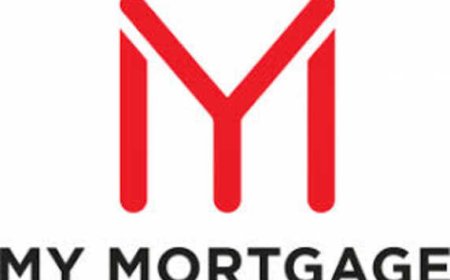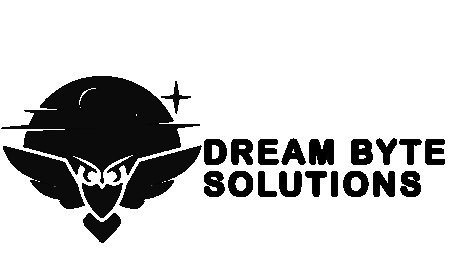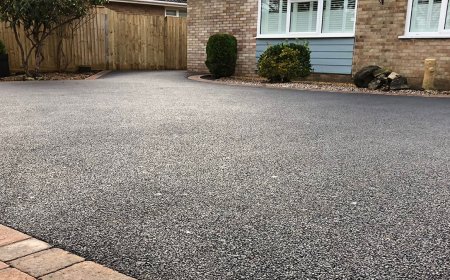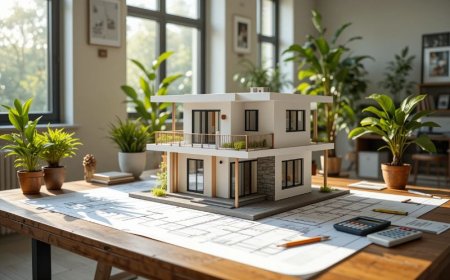Real Estate Mobile App Development in Dubai: A Complete Guide for 2025
The evolving landscape of Dubai's real estate market, combined with rapid technological advancements, offers a unique opportunity for innovation in mobile app development. As we approach 2025, there is a growing demand for sophisticated, user-friendly, and highly integrated real estate applications.
This comprehensive guide explores the details of real estate mobile app development in Dubai, providing valuable insights for businesses looking to take advantage of this expanding sector.
The Evolving Dubai Real Estate Market in 2025
Dubai's real estate market in 2025 continues to experience significant growth, fueled by a strong demand for digital solutions. Property prices have remained robust, with both villas and apartments appreciating steadily. The market is maturing and shifting towards a more balanced supply-demand dynamic, signaling sustainable long-term growth. Investors and end-users alike are increasingly confident in Dubai's property market, actively seeking opportunities across various segments.
Several key factors underpin this vibrant market:
-
Strong Economic Fundamentals: Dubai's diversified economy, business-friendly policies, and strategic location continue to attract global investments and contribute to a growing population.
-
Government Initiatives: The Dubai 2040 Urban Master Plan and other smart city initiatives are fostering a digitally enabled urban environment, focusing on integrating technology into urban planning and real estate development.
-
High Demand: Residential rents have reached a 10-year high, suggesting that demand is outpacing supply. This creates a favorable environment for both sales and rental property platforms.
-
Luxury and Innovation: Dubai remains a hub for luxury properties, with significant interest in off-plan investments and properties featuring smart home systems and modern amenities.
The Rise of PropTech in the UAE
PropTech, or property technology, is rapidly transforming the real estate sector in the UAE. The market was valued at USD 0.61 billion in 2024 and is projected to reach USD 1.55 billion by 2030, growing at a compound annual growth rate (CAGR) of 17.49%. This growth is driven by several key factors:
-
Digital Transformation: The UAE's national agendas emphasize the importance of a paperless economy and e-governance, which directly influence real estate practices. The Dubai Land Department (DLD) has played a crucial role in this transition, with platforms like Dubai REST facilitating over 80% of property transactions digitally.
-
Blockchain Adoption: Dubai is leading the way in integrating blockchain technology into real estate. Major developers, such as DAMAC, Emaar, and Nakheel, are already accepting cryptocurrency payments (including Bitcoin, Ethereum, Tether, and USD Coin) for property transactions. Smart contracts, based on blockchain, are becoming increasingly common and will likely be mandatory for all real estate transactions by 2025, demonstrating the government's commitment to transparency and efficiency.
-
AI and IoT Integration: Real estate developers are increasingly adopting AI-powered management platforms and Internet of Things (IoT) integrated infrastructure to enhance efficiency and improve user experience. AI technology is also used to monitor property listings and transactions, proactively identifying potential compliance issues.
-
Government Support: Dubai's vision for a crypto-integrated economy and its continuous hosting of global PropTech events like 'PropTech Connect 2026' underscore the government's dedication to innovation in the real estate sector.
Why Invest in a Real Estate Mobile App in Dubai for 2025?
Developing a real estate mobile app in Dubai in 2025 is not just an option but a strategic imperative. Here's why:
-
Cater to Digital-First Consumers: A significant portion of property searches and transactions now begin and often conclude online. A mobile app offers convenience and accessibility that traditional methods cannot match.
-
Competitive Advantage: The market, while growing, is also becoming more competitive. A well-designed, feature-rich app can differentiate your business, attracting more buyers, sellers, and renters.
-
Enhanced User Experience: Apps offer personalized experiences, real-time updates, and interactive features that significantly improve the user journey.
-
Operational Efficiency: Automation of routine tasks, lead handling solutions, and integrated management systems within an app can streamline business operations, reducing manual effort and errors.
-
Data-Driven Insights: Mobile apps provide invaluable data on user behavior, market trends, and property performance, enabling businesses to make informed decisions and refine their strategies.
-
Increased Reach and Promotion: An app extends your market reach beyond geographical boundaries, offering a powerful platform for property promotion and targeted advertising.
The Real Estate Mobile App Development Process
Creating a successful real estate mobile application involves a structured, strategic approach across several critical phases. Each step is tailored to ensure the app meets market demands, complies with regional regulations, and delivers a seamless user experience.
1. Discovery & Planning
The foundation of a successful real estate app begins with a clear understanding of the market landscape and user expectations.
-
Market Research
Conduct in-depth research of the Dubai real estate market, identifying key trends, user pain points, and competitive offerings to ensure the app addresses actual market needs.
-
Define Goals & Objectives
Establish clear goals such as lead generation, sales enablement, or customer support enhancement. Define the primary user personas and align business outcomes with user needs.
-
Feature Prioritization
Based on research insights and business objectives, determine which features are essential for launch (MVP) and which can be considered as advanced or future enhancements.
-
Technology Stack Selection
Choose the appropriate development approach, native (Swift for iOS, Kotlin for Android) or cross-platform (Flutter, React Native). Select robust backend technologies like Node.js, Django, or Ruby on Rails and pair with scalable databases such as Firebase, MongoDB, or MySQL.
-
Regulatory Compliance Strategy
Plan proactively to ensure full compliance with Dubai Land Department (DLD) regulations, including legal, transactional, and data governance requirements.
2. UI/UX Design
The design phase focuses on creating an engaging, intuitive, and culturally aligned experience for users.
-
User Flow Mapping
Design smooth, logical pathways that guide users from initial interaction to desired outcomes (e.g., viewing listings, making inquiries).
-
Wireframing & Prototyping
Develop initial wireframes and interactive prototypes to visualize the apps layout and user interactions before development begins.
-
Visual Design
Craft a modern, elegant interface that reflects Dubais urban sophistication. Emphasize usability through clear navigation, intuitive controls, and consistent branding across screens.
3. Development
This phase translates designs and planning into a functional, high-performing mobile application.
-
Frontend Development
Implement the user interface and experience across selected platforms, ensuring responsiveness and consistency.
-
Backend Development
Build the core infrastructure to support data management, user accounts, property listings, and transactional workflows.
-
API Integrations
Integrate essential third-party services such as maps (Google Maps), payment gateways, CRM systems, and potentially blockchain or DLD property systems for real-time updates.
-
Security Implementation
Embed strong security measures, including encrypted data transmission, two-factor authentication, and compliance with local and international privacy standards.
4. Testing
Thorough testing ensures the app is functional, reliable, and secure across all scenarios.
-
Functionality Testing
Verify that all features and interactions work according to requirements.
-
Usability Testing
Assess the app's ease of use with real users, refining areas of confusion or friction.
-
Performance Testing
Measure loading times, responsiveness, and behavior under varying conditions and user loads.
-
Security Testing
Conduct penetration testing to uncover vulnerabilities and reinforce app security.
-
Compatibility Testing
Ensure seamless operation across different screen sizes, device types, and operating system versions.
5. Deployment & Launch
The app is prepared for release, with steps taken to maximize visibility and adoption.
-
App Store Submission
Package and submit the app to the Apple App Store and Google Play Store, ensuring full compliance with their review guidelines.
-
Marketing & Promotion
Execute a launch campaign using digital channels, influencer partnerships, PR initiatives, and in-app promotions to drive initial downloads and engagement.
6. Post-Launch Support & Maintenance
Continuous improvement is essential for long-term success and user retention.
-
Continuous Monitoring
Track usage metrics, crash reports, and user behavior to identify issues and opportunities for improvement.
-
Regular Updates
Roll out updates that include bug fixes, performance improvements, and new features aligned with user feedback and market evolution.
-
Security Patches
Maintain a proactive approach to app security by releasing timely updates to counteract emerging threats.
Cost of Real Estate Mobile App Development in Dubai
The cost of developing a real estate mobile app in Dubai varies significantly based on several factors:
-
App Complexity & Features: A basic app with core functionalities might cost between AED 50,000 and AED 150,000. A moderately complex app with advanced search, payment integration, and multi-language support could range from AED 150,000 to AED 350,000. A feature-rich, enterprise-level app incorporating AI, AR/VR, blockchain, and extensive integrations could range from AED 350,000 to AED 550,000 or more.
-
Platform Choice: Developing for both iOS and Android (native apps) will be more expensive than a single-platform app or a cross-platform solution (though cross-platform might have performance limitations for highly complex features).
-
UI/UX Design Complexity: Custom, high-end designs require more effort and thus higher costs.
-
Technology Stack: The specific technologies and frameworks chosen can impact development time and cost.
-
Third-Party Integrations: The number and complexity of integrations with external services (payment gateways, CRM, DLD systems) add to the cost.
-
Development Team Location & Expertise: Hiring a reputable development company in Dubai or the UAE generally entails higher costs than offshore teams, but often ensures better local market understanding and quality.
Ongoing costs for maintenance, support, hosting, and cloud services typically range from AED 18,000 to AED 75,000 annually.
Top 3 Real Estate App Development Companies in Dubai
Several reputable app and web development companies in Dubai and the UAE specialize in real estate solutions. Some of the highly-rated firms based on their expertise and client reviews include:
1. Apptunix
Overview:
Apptunix is a prominent app and web development company making a significant impact in Dubai's tech scene. With a strong emphasis on the real estate sector, they develop smart and user-friendly mobile applications. These include sleek property listing platforms, efficient tenant management systems, and immersive virtual tour features. Their solutions are designed to help real estate businesses stay competitive in a rapidly evolving market.
Strengths:
-
Deep experience in real estate app development
-
End-to-end services from ideation to deployment
-
Expertise in both native and cross-platform technologies
-
Known for sleek UI/UX and scalable backend architectures
Versatile Portfolio: Apptunix has successfully completed a variety of projects, including dating apps, real estate platforms, and internal business applications, which demonstrates their adaptability across different sectors.
Visit Website: https://www.apptunix.com/
2. Lumitech
Overview:
Lumitech is a Dubai-based technology company that focuses on mobile and web applications. With a keen understanding of the UAEs real estate regulatory and user landscape, Lumitech offers highly localized and compliance-ready app solutions.
Strengths:
-
Custom real estate CRM and listing portal development
-
Strong grasp of Dubai Land Department (DLD) integration requirements
-
Agile development processes with rapid prototyping
3. Imaga
Overview:
Imaga is a creative digital solutions provider that blends technology and design to build impactful real estate applications. The company emphasizes intuitive user experiences and data-driven functionality, helping real estate businesses modernize operations and engage users more effectively.
Strengths:
-
Focus on user-centered design and interaction
-
Integration of map-based search, property management, and booking systems
-
Expertise in cross-platform frameworks like Flutter and React Native
When choosing a development partner, consider their experience in the real estate sector, their understanding of the Dubai market, their technological expertise (especially in AI, AR/VR, and blockchain), their UI/UX design capabilities, and their post-development support.
Conclusion
The year 2025 marks a pivotal moment for real estate mobile app development in Dubai. With a buoyant property market, strong government backing for digital transformation, and rapid advancements in PropTech, the opportunities are immense. By strategically investing in a feature-rich, user-centric, and compliant mobile app, businesses can not only meet the evolving demands of the Dubai real estate market but also establish a dominant position in this exciting digital frontier. The key to success lies in understanding market dynamics, embracing cutting-edge technologies, prioritizing user experience, and ensuring strict adherence to the regulatory landscape.
FAQ:
1. Why is 2025 the right time to develop a real estate mobile app in Dubai?
In 2025, Dubai's real estate market is experiencing strong growth, digital adoption, and PropTech innovation. A mobile app allows businesses to reach tech-savvy consumers, streamline operations, and gain a competitive edge in this evolving market.
2. What are the key features of a successful real estate mobile app in Dubai?
Essential features include smart property search, virtual tours, secure payment options, multilingual support, AI-driven recommendations, DLD integration, and real-time chat support.
3. How much does it cost to build a real estate mobile app in Dubai?
Development costs range from AED 30,000 to AED 150,000+, depending on the apps complexity, platform choice, UI/UX design, third-party integrations, and chosen tech stack.
4. What makes Dubai unique for real estate app development?
Dubais government support for digital transformation, advanced infrastructure, rising property demand, and integration of blockchain and AI technologies make it a hotspot for real estate innovation.
5. What is PropTech and how is it impacting Dubai's real estate industry?
PropTech (property technology) refers to digital tools used in real estate. In Dubai, it includes blockchain for secure transactions, AI for smarter listings, and mobile apps for seamless buying, renting, and selling experiences.
6. What are the top real estate app development companies in Dubai?
Notable companies include Apptunix and Lumitech known for custom solutions, DLD compliance, cross-platform capabilities, and real estate-specific experience.
















![Top 9 Real Estate Mobile App Developers in Riyadh, Saudi Arabia [2025 Edition]](https://www.biphoo.uk/uploads/images/202507/image_430x256_6879d0d524335.jpg)


















